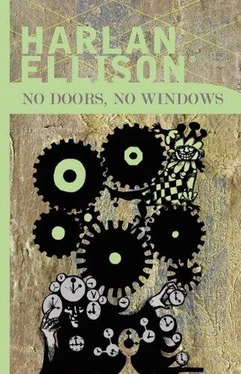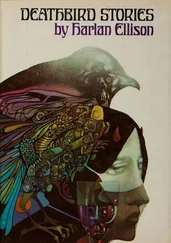His soft, blue eyes stared back at me without a trace of guile. There was no smile anywhere in that face. Tired; old and terribly tired. “We’re all amusing, William. Except when we get too old to take care of ourselves, when we get too old to keep up. Then we cease to be amusing. You don’t want to talk about yourself?”
I spread my hands in surrender. I would talk about myself. He may have conceived of himself as too old to be amusing, but he was a fascinating old man nonetheless. He was a good listener. And the rest of the room faded, and we talked. I told him about myself, about life on the Coast, the plots of my books, in précis , what it took to adapt a suspense novel for the screen.
Body language is interesting. On the most primitive level, even those unfamiliar with the unconscious messages the positions of the arms and legs and torso give, can perceive what’s going on. When two people are talking and one is trying to get across an important point to the other, the one making the point leans forward; the one resisting the point leans back. I realized I was leaning far forward and to the side, resting my chest on the arm of the sofa. He wasn’t sinking too far back in the soft cushions of the easy chair; but he was back, in any event. He was listening to me, taking in everything I was saying, but it was as though he knew it was all past, all dead information, as though he was waiting to tell me some things I needed to know.
Finally, he said, “Have you noticed how many of the stories you’ve written are concerned with relationships of fathers to sons?”
I’d noticed. “My father died when I was very young,” I said, and felt the usual tightness in my chest “Somewhere, I don’t remember where, I stumbled on a line Faulkner wrote once, where he said, something like, ‘No matter what a writer writes about, if it’s a man he’s writing about the search for his father.’ It hit me particularly hard. I’d never realized how much I missed him until one night just a few years ago, I was in a group encounter session and we were told by the leader of the group to pick one person out of the circle and to make that person someone we wanted to talk to, someone we’d never been able to talk to, and to tell that person everything we’d always wanted to say. I picked a man with a mustache and talked to him the way I’d never been able to talk to my father when I was a very little boy. After a little bit I was crying.” I paused, then said very softly, “I didn’t even cry at my father’s funeral. It was a very strange thing, a disturbing evening.”
I paused again, and collected my thoughts. This was becoming a good deal heavier, more personal, than I’d anticipated, “Then, just a year or two ago, I found that quote by Faulkner; and it all fitted into place.”
The tired old man kept watching me. “What did you tell him?”
“Who? Oh, the man with the mustache? Hmmm. Well, it wasn’t anything that potent. I just told him I’d made it, that he would be proud of me now, that I had succeeded, that I was a good guy and … he’d be proud of me. That was all.”
“What didn’t you tell him?”
I felt myself twitch with the impact of the remark. I went chill all over. He had said it so casually, and yet the force of the question jammed a cold chisel into the door of my memory, applied sudden pressure and snapped the lock. The door sprang open and guilt flooded out. How could Marki have known?
“Nothing. I don’t know what you mean.” I didn’t recognize my voice.
“There must have been something. You’re an angry man, William. You’re angry at your father. Perhaps because he died and left you alone. But you didn’t say something very important that you needed to say; you still need to say it. What was it?”
I didn’t want to answer him. But he just waited. And finally I murmured, “He never said goodbye. He just died and never said goodbye to me.” Silence. Then I shook, helplessly, trembled, reduced after so many years to a child, tried to shake it off, tried to dismiss it, and very quietly said, “It wasn’t important.”
“It wasn’t important for him to hear it; but it was for you to say it.” I couldn’t look at him.
Then Marki said, “In the lens of time we are each seen as a diminishing mote. I’m sorry I upset you.”
“You didn’t upset me.”
“Yes. I did. Let me try and make amends. If you have the time, let me tell you about a few books I wrote. You may enjoy this.” So I sat back and he told me a dozen plots. He spoke without hesitations, fluidly, and they were awfully good. Excellent, in fact. Suspense stories, something in the vein of James M. Cain or Jim Thompson. Stories about average people, not private eyes or foreign agents; just people in stress situations where violence and intrigue proceeded logically from entrapping circumstances. I was fascinated. And what a talent he had for titles: DEAD BY MORNING, CANCEL BUNGALOW 16, AN EDGE IN MY VOICE, WHITEMAIL, THE MAN WHO SEARCHED FOR JOY, THE DIAGNOSIS OF DR. D’ARQUEANGEL, PRODIGAL FATHER and one that somehow struck me so forcibly I made a mental note to contact Andreas Brown at the Gotham Book Mart, to locate a used copy for me through his antiquarian book sources. I had to read it. It was titled LOVER, KILLER.
When he stopped talking he looked even more exhausted than when he’d asked me to sit down. His skin was almost gray, and the soft, blue eyes kept closing for moments at a time. “Would you like a glass of water or something to eat?”
He looked at me carefully, and said, “Yes. I’d very much like a glass of water, thank you.”
I got up, to force my way through to the kitchen.
He put his dry hand on mine. I looked down at him. “What do you want to be, eventually, William?”
I could have given a flip answer. I didn’t. “Remembered,” I said. Then he smiled, and removed his hand.
“I’ll get that water; be right back.”
I pushed through the crowd and got to the kitchen. Bob was still there, arguing with Hans Santesson about cracking the pro rata share of royalties problem for reprints of stories in college-level text-anthologies. Hans and I shook hands, and exchanged quick pleasantries while I drew a glass of water and put in a couple of ice cubes from the plastic sack half-filled with melted cubes in the sink. I didn’t want to leave Marki for very long.
“Where the hell have you been tonight?” Bob asked.
“I’m sitting way at the back, with an old man; fascinating old man. Used to be a writer, he says. I don’t doubt it. Jesus, he must have written some incredible books. Don’t know how I could have missed them. I thought I’d read practically everything in the genre.”
“What is his name?” Hans asked, with that soft lovely Scandinavian accent.
“Marki Strasser,” I said. “What a goddam sensational story-sense he’s got.”
They were staring at me.
“Marki Strasser?” Hans had frozen, his cup of tea halfway to his lips.
“Marki Strasser,” I said again. “What’s the matter?”
“The only Marki I know, who was a writer, was a man who used to come to these evenings thirty years ago. But he’s been dead for at least fifteen, sixteen years.”
I laughed. “Can’t be the same one, unless you’re wrong about his having died.”
“No, I am certain about his death. I attended his funeral.”
Then it’s someone else.”
“Where’s he sitting?” Bob asked.
I stepped out into the passage and motioned them to join me. I waited for the crowd to sway out of the way for a moment, and pointed. “There, back in the corner, in the big easy chair.”
There was no one in the big easy chair. It was empty.
And as I stared, and they stood behind me, staring, a woman sat down in the chair and went to sleep, a cocktail glass in her hand. “He got up and moved somewhere else in the room,” I said.
Читать дальше












